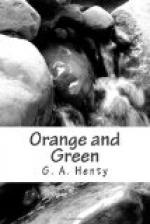Had it not been that Walter Davenant’s widow was an Englishwoman, and a relation of General Ireton, the whole of the estate would have gone; but his influence was sufficient to secure for her the possession of the ruins of her home, and a few hundred acres surrounding it. Fortunately, the dowry which Mrs. Davenant had brought her husband was untouched, and a new house was reared within the ruins of the castle, the new work being dovetailed with the old.
The family now consisted of Mrs. Davenant, a lady sixty-eight years old; her son Fergus, who was, when Cromwell devastated the land, a child of five years; his wife Katherine, daughter of Lawrence McCarthy, a large landowner near Cork; and their two sons, Walter, a lad of sixteen, and Godfrey, twelve years old.
Two miles west of the castle stood a square-built stone house, surrounded by solidly-constructed barns and outbuildings. This was the abode of old Zephaniah Whitefoot, the man upon whom had been bestowed the broad lands of Walter Davenant. Zephaniah had fought stoutly, as lieutenant in one of Cromwell’s regiments of horse, and had always considered himself an ill-treated man, because, although he had obtained all the most fertile portion of the Davenant estate, the old family were permitted to retain the castle, and a few hundred acres by the sea.
He was one of those who contended that the Amalekites should be utterly destroyed by the sword, and he considered that the retention of the corner of their domains, by the Davenants, was a direct flying in the face of the providence who had given them into the hands of the faithful. Not that, had he obtained possession of the ruined castle, Zephaniah Whitefoot would have repaired it or set up his abode there. The followers of Cromwell had no eyes for the beautiful. They were too much in earnest to care aught for the amenities of life, and despised, as almost sinful, anything approximating to beauty, either in dress, person, or surroundings. The houses that they reared, in this land of which they had taken possession, were bare to the point of ugliness, and their interior was as cold and hard as was the exterior. Everything was for use, nothing for ornament. Scarce a flower was to be seen in their gardens, and laughter was a sign of levity, to be sternly repressed.
Their isolation, in the midst of a hostile population, caused them no concern whatever. They cared for no society or companionship, save that of their own households, which they ruled with a rod of iron; and an occasional gathering, for religious purposes, with the other settlers of their own faith. They regarded the Irish as Papists, doomed to everlasting perdition, and indeed consigned to that fate all outside their own narrow sect. Such a people could no more mix with the surrounding population than oil with water. As a rule, they tilled as much ground in the immediate vicinity of their houses as they and their families could manage, and the rest of the land which had fallen into their possession they let, either for a money payment, or, more often, for a portion of the crops raised upon it, to such natives as were willing to hold it on these terms.




